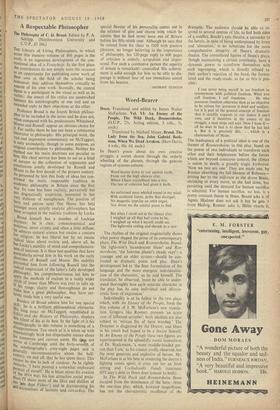A Respectable Philosopher
THE Library of Living Philosophers, in which series this massive volume of 866 ,pages is the tenth, is an ingenious development of the con- ventional idea of a Festschrif t. In the first place the contributors do not simply seize the occasion as an opportunity for publishing some work of their own in the field of the scholar being honoured; they address themselves critically to asPeets of his own work. Secondly, the central figure is a participant in the ritual as well as its Victi m : the essays of his critics are sandwiched between his autobiography at one end and an extended reply to their objections at the other.
Professor Broad is the fourth British philoso- pher to be included in the series and he does not, when compared with his predecessors Whitehead, Moore and Russell. appear an obvious choice for
For unlike them he has not been a substantial Innovator in philosophy His principal work, the vaSt and impressive commentary on McTaggart, is only secondarily, though to some purpose, an Original contribution to philosophy. Neither his elhod nor his main doctrines are peculiar to nini. His chief service has been to act as a kind of curator to the collection of arguments and ,Onclusions jointly developed by Russell and moore in the first decade of the present century. As presented by him this body of ideas has con- stituted the main, respectable tradition in academic philosophy in Britain since the first War. Its tone has been realistic, pervasively but 11°r dogmatically empiricist, interested in but Very dubious of metaphysics. The position of nero and patron saint that Hume has held amongst more strictly analytic philosophers has been occupied in the realistic tradition by Locke.
Broad himself has a number of Lockian features: he is clear, commonsensical and tentative; never cryptic and often a little diffuse; he admires natural science but retains a concern ror religion; he has liberal but by no means radical ideas about society and, above all, he has Locke's stability of mind and comprehensive- ness of interests. It is these last qualities that have Particularlyt served him in his work on the early doctrines of Russell and Moore. His stability Prevented him from following Russell into the radical empiricism of the latter's fully developed Philosophy; his comprehensiveness led him lo aPP1Y the methods of realism to a vastly wider tejrcle of issues than Mbore was ever to take up. 11 his range, clarity and thoroughness do not n2_ake him a great philosopher, they have cer- tainly made .him a very useful one. st Readers of Broad admire him for one special 1;111: he is a brilliant philosophical obituarist. 'te long essay on McTaggart, republished in ,t!zies and the History of Philosophy, displays uns talent of his at its best. In the light of it his sip.tomgr —oaphy in this volume is something of a . 'saPPointment. Too much of it is taken up with Znlertainingly brisk but dispensable matter about :Is numerous and curious aunts. He d.ails not the at Cambridge until the forty-severlth of the autobiography's sixty-eight pages and is Unerally uncommunicative about the half- ccentury, on and off, that he has spent there. This
rannot be due to lack of candour. As he rightly ernarks, I have painted a somewhat unpleasant
Po_rtraitof myself.' He is blunt about his evasion 1914 war, his less attractive social preju- , !▪ ices (*I share most of the likes and dislikes of late dear Fiihrer') and in documenting his accusations of laziness and cowardice. The special flavour of his personality comes out in the mixture of glee and shame with which he admits that he had never been out of Britain before his fifty-ninth year. Although he says that he retired from his chair in 1953 with positive pleasure, no longer believing in the importance of philosophy, his 120-page reply to 600 pages of criticism is orderly, scrupulous and imper- sonal. For such a combative person the asperity of debate is remarkabk controlled. His achieve- ment is solid enough for him to be able to dis- parage it without fear of too immediate assent from his hearers.
ANTHONY QUINTON


































 Previous page
Previous page